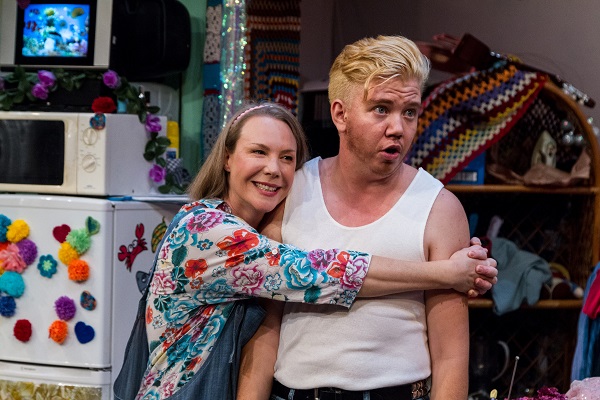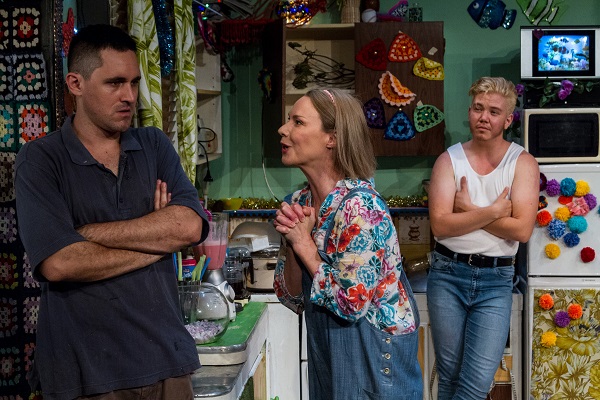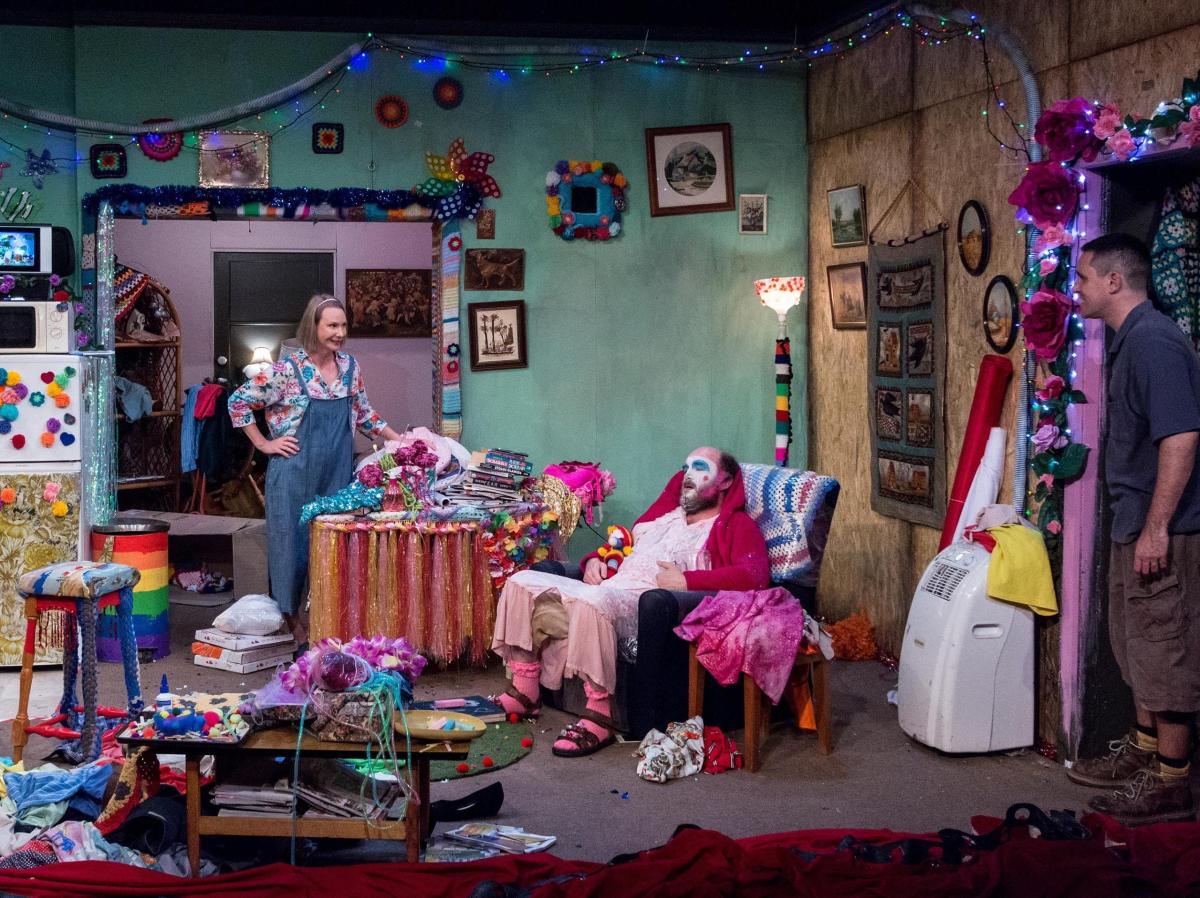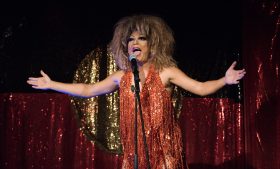Image: Belinda McClory, Ben Grant, Jordan Fraser-Trumble in Hir. Photo (c) Teresa Noble.
Californian born, New York based performance artist, actor, queer activist and playwright Taylor Mac is back in Melbourne town in the form of judy’s 2015 hit play Hir, presently playing at the Red Stitch Theatre (Mac’s preferred gender pronoun is the lower-case “judy”). Hir presents a continuation of Mac’s ferocious articulation of the post-patriarchal spirit that delighted audiences at the Melbourne Festival last year in judy’s celebrated 24-hour performance, A 24 Decade History of Popular Music. With excoriating wit, expert theatrical timing and prose that sings like poetry, Mac’s play entrances the audience and then discombobulates them to guard against over-simplifications when it comes to looking at the contemporary re-negotiation of gender and the legacy of patriarchy.

Image: Belinda McClory, Harvey Kaska Zielinski in Hir. Photo (c) Teresa Noble.
To discuss these issues Mac sets judy’s play in a lion’s den of gender roles, patriarchy and traditions: the working class nuclear family. The play is set entirely in the kitchen of a substandard house in an unknown backwater deep in the USA. The house is luridly decorated and in a state of complete and unsightly chaos, with surfaces weighed down by crockery, piles of furniture and a floor scattered with clothing.
Paige (Belinda McClory) and her husband, Arnold (Ben Grant) are in the room as the play opens; Paige is a loud talking, 40-year old woman who has drugged her husband following a marriage in which she witnessed him hospitalise her children, rape her, punch holes in the walls of their house and tyrannise the family. Now she feeds him massive doses of pills in the form of smoothies, laced with oestrogen, to keep Arnold in a state of stupefied docility. Furthermore she dresses him in women’s clothes and paints him in clown make-up.
The play begins with Paige excitedly anticipating the arrival of her marine son, Isaac (Jordan Fraser-Trumble) who is returning to the family home from the war after three years overseas. Isaac, a meth addict and traumatised by his role of collecting dead bodies from combat zones (he vomits without warning) reacts badly to the domestic chaos, the beard of his newly transitioned sibling Max (Harvey Kaska Zielinski) and his vegetative father. Paige reassures Isaac that the household’s new age is a welcome one and that with the help of her transitioning youngest child Max she is enthusiastically embracing the realisation that “there are no longer two genders, there is an alphabet of gender, LGBTTSQQIA…everybody is a little bit of everything, we are all us!”
The play’s next two hours centre around the unfolding tension between Isaac and Paige battling to assert their vision over the family. Isaac attempts to reinstate the former patriarchal order of the family, urging his father to remember his masculine ways. “You are a man. You take up space. You sweat. You make your mark. You dole out punishments, allowances. You give us bruises. You sit and stare at things. I sit with you and stare at the things you are staring at. We are quiet. You never cook except once a month when you cook fried chicken. You are a man. You like to come home to order.” Buoyed by his oldest son, Arnold points at Paige, as his smoothie’s effect wanes “I don’t like her”, and as an aside to his son confesses “My penis is my best friend”. Paige will not be quietened, she volubly denounces the fascist heteronormative model which wrought various types of violence on all of them and fights for its dismantling.

Image: Jordan Fraser-Trumble, Belinda McClory, Harvey Kaska Zielinski in Hir. Photo (c) Teresa Noble.
The fourth member of the family Max is played splendidly by Harvey Zielinski. Of all the characters Max is the most changed by the crossfire of the family’s interaction over the day portrayed in the play, slowly expressing hir discomfort of Paige’s investment in queer identity and hir desire to be in a like-minded community where ze feels undertstood. Through Max’s words Mac poignantly reveals the social isolation for transgendered people as well as the teaching role queer culture is saddled with: to constantly update the heteronormative culture on gender politics. Max confesses to hir brother “She is not homeschooling me, I am homeschooling her, and it is exhausting. It’s fucking exhausting teaching people.” Max describes how “ze” has no real friends because “there is literally nobody, and I mean literally not figuratively, within a 100km radius who is like me.”
Mac interweaves political narrative with acute observations of emotional and physical violence within the pressure cooker of a family home. Hir is an outstanding piece of contemporary theatrical writing, as strong as anything by John Osborne or Sam Shepard would have been in its time. It is punchy, accessible and confronting theatre which throws up controversial questions. The acting is outstanding and it is a triumph by the director, Daniel Clarke.
5 stars out of 5
Hir
By Taylor Mac
Directed by Daniel Clarke
Set & Costume Design: Adrienne Chisholm
Lighting Design: Richard Vabre
Sound Design: Ian Moorhead
Assistant Director: Thomas Quirk
Dialect Coach: Jean Goodwin
Stage Managers: Jackie Mates & Stephanie Young
Assistant Stage Manager: Sophie Capern
Featuring Jordan Fraser-Trumble, Ben Grant, Belinda McClory and Harvey Zielinski
Red Stitch Actors Theatre, East St Kilda
30 January – 4 March 2018





